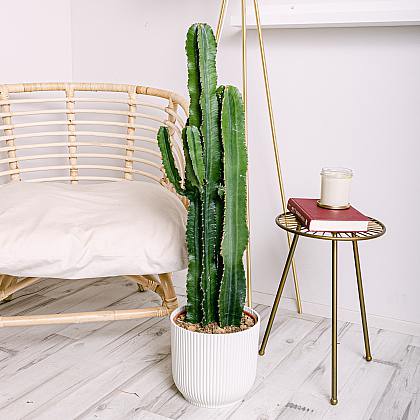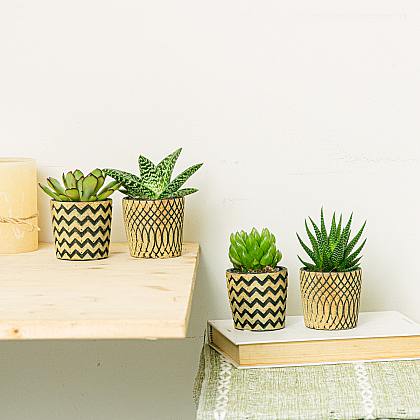Discover 10 plants that will help you sleep better in your home
Adequate rest is essential for our overall health and well-being. However, sometimes, we find it difficult to fall asleep or enjoy a restful sleep at home
Adequate rest is essential for our overall health and well-being. However, sometimes, we find it difficult to fall asleep or enjoy a restful sleep at home. Fortunately, there are a variety of houseplants that can help us improve our sleep and promote relaxation. In this article, we'll find out what these plants are and how they can benefit us. From soothing lavender to exotic jasmine to the refreshing scent of peppermint, we'll explore the properties and benefits of these plants for a restful night's sleep at home. Read on to learn more!
The importance of a good night's sleep
Rest is essential for people's physical and mental well-being. During sleep, our body recovers from daily activities and prepares to face the challenges of the next day. Getting a good night's sleep not only helps us maintain good health, but also improves our quality of life. A good night's sleep reduces stress, increases the ability to concentrate, and improves mood. On the other hand, lack of sleep can lead to irritability, extreme tiredness, headaches, and memory problems. In addition, chronic insomnia has been shown to increase the risk of cardiovascular disease, diabetes, and obesity. Therefore, it is important to dedicate time to sleep and create an environment conducive to it. To achieve a restful night's sleep, it is necessary to take into account several factors such as the temperature of the room, the comfort of the mattress and pillow, as well as the reduction of noise and light. Sleep-promoting houseplants such as lavender, jasmine, or peppermint can also be used. In short, getting a good night's sleep is key to maintaining good physical and mental health and enjoying a full and fulfilling life.
Houseplants That Promote Sleep
Houseplants can play an important role in promoting restful sleep. Some specific strains have relaxing and calming properties that can help create an environment conducive to rest. One of these plants is lavender, known for its relaxing, sleep-inducing scent. Placing a lavender plant in the bedroom can help reduce stress and anxiety, creating a calm environment conducive to falling asleep. Another plant that promotes sleep is jasmine. This exotic plant emits a sweet, mild aroma that has calming and calming properties. Jasmine can also help reduce anxiety levels and improve sleep quality. In addition, aloe vera, in addition to its benefits for the skin, can also purify the air and promote relaxation. This plant releases oxygen during the night, which helps improve the air quality in the room and makes it easier to breathe during sleep. St. John's wort is another houseplant that can be helpful for those who suffer from insomnia. This plant has sedative properties and can help calm the mind and promote deeper sleep. Finally, mint is a refreshing and calming plant that can be ideal for better sleep. Its fresh aroma helps relax muscles and relieve tension, creating a relaxing environment to fall asleep. In summary, having houseplants such as lavender, jasmine, aloe vera, St. John's wort, and peppermint at home can contribute to improving sleep quality by creating a relaxing environment conducive to proper rest.
Lavender: The Relaxing Scent That Will Induce Sleep
Lavender is a plant known for its soothing aroma and sedative properties, making it an ideal choice for promoting restful sleep. Its sweet, floral fragrance has been used for centuries to induce calm and relieve stress. The scent of lavender has positive effects on the nervous system, helping to reduce anxiety and help you fall asleep faster and deeper. Inhaling its perfume stimulates the production of chemicals in the brain, such as serotonin, which promote relaxation and improve mood. In addition, lavender can also help regulate heart rate and blood pressure, contributing to a calmer rest. To reap the benefits of lavender, you can place a bouquet of dried flowers in the bedroom or use lavender essential oil in a diffuser. It is also possible to add a few drops of essential oil to a pillow or sprinkle a diluted mixture on the sheets before bed. However, it's important to remember that everyone can react differently to scents, so it's advisable to test and adjust the amount based on individual preference.
Jasmine: An Exotic Plant That Soothes and Soothes
Jasmine is an exotic plant that has been valued for its calming and calming properties since ancient times. In addition to its beauty, this plant boasts a sweet and relaxing aroma that helps reduce stress and anxiety. Some research has shown that the smell of jasmine can help improve sleep quality, reducing the time needed to fall asleep and increasing the amount of deep, restful sleep. This plant is also used in aromatherapy to relieve headaches, depression, and nervousness. In terms of care, jasmine needs a bright place but without direct sun exposure, and moderate watering. It is important to note that some people may be allergic to jasmine pollen, so it is recommended to avoid using it in cases of respiratory allergies. In addition, although it is a safe plant, it is not recommended for use during pregnancy or breastfeeding due to the lack of studies on its possible effects in these cases. In summary, jasmine is a natural and effective option to promote relaxation and restful sleep, as long as its care and possible contraindications are taken into account.
Aloe vera: purifies the air and promotes relaxation
Aloe vera is a plant known for its numerous health benefits, but it can also be an ally to improve our rest. In addition to its healing and regenerative properties for the skin, aloe vera is also capable of purifying the air and promoting relaxation in our home.
This succulent plant is able to filter and remove toxins from the air, contributing to a cleaner, healthier sleeping environment. By removing pollutants such as formaldehyde and benzene, which can be released by common chemicals in our home, aloe vera helps reduce respiratory irritation and promotes better air quality in our room.
In addition, aloe vera emits oxygen during the night, which can help improve sleep quality. The presence of extra oxygen in the air can promote relaxation and provide a feeling of coolness in the room, contributing to an environment conducive to restful sleep.
To take full advantage of the benefits of aloe vera, it is recommended to place the plant near a window where it will receive enough indirect sunlight. Additionally, it's important to remember that aloe vera doesn't need a lot of water or special care, making it an ideal choice for those looking for a low-maintenance plant.
In short, aloe vera is not only known for its healing properties for the skin, but it can also purify the air and promote relaxation in our home. Placing this plant in our room can help us create a healthier environment conducive to restful sleep.
St. John's Wort: A Natural Remedy Against Insomnia
St. John's Wort is known as an effective natural remedy for insomnia. This plant, also known as St. John's wort, contains chemical compounds that act on the central nervous system, promoting relaxation and helping you fall asleep. St. John's Wort has been used for centuries as an herbal treatment for sleep problems and anxiety. Its sedative and calming properties help reduce mental and physical agitation, making it easier to get restful sleep. In addition, St. John's Wort has been shown to increase levels of serotonin in the brain, a chemical that helps regulate mood and promote feelings of well-being. Not only does this help fight insomnia, but it can also improve overall sleep quality. However, it is important to note that St. John's Wort can interact with certain medications and may cause side effects in some people, such as sun sensitivity or an upset stomach. Therefore, it is advisable to consult a healthcare professional before beginning any St. John's Wort treatment to ensure that it is safe and suitable for each individual.
Peppermint: refreshing and soothing, ideal for better sleep
Peppermint is a plant that has been used since ancient times for its medicinal and relaxing properties. This plant is known for its fresh, minty aroma, which has a cooling effect on the body and mind. In addition, peppermint is rich in menthol, a compound that has analgesic and anti-inflammatory properties that can help relieve headaches and muscle aches, which can contribute to improved sleep.
In addition, peppermint has a calming effect on the nervous system, which can help reduce stress and anxiety levels. Inhaling its aroma stimulates the production of endorphins, hormones that have a relaxing effect on the body and mind. For this reason, it is recommended to use peppermint essential oils in diffusers or vaporizers to create a relaxing atmosphere before sleeping.
An infusion of fresh mint leaves can also be prepared to drink before sleeping. Peppermint is a safe and natural plant that has no known negative side effects when used correctly. However, caution should be exercised if you are taking any medications as they may interact with them.
In summary, peppermint is a refreshing and calming plant that can help improve sleep quality thanks to its analgesic and anti-inflammatory properties, as well as its ability to reduce stress and anxiety levels. It can be used in the form of essential oils or infusions to create a relaxing atmosphere before sleeping.
In short, restful sleep is essential for our physical and mental well-being. Houseplants can be a great way to improve the quality of our rest at home. Lavender, jasmine, aloe vera, St. John's wort, and mint are just a few of the options available to create a relaxing atmosphere in our home. However, we must remember that each person has unique needs and what works for some may not work for others. Therefore, it is important to experiment and find the plants and techniques that best suit our individual needs. What other plants do you know of that help improve sleep? Have you tried any additional techniques to get a better night's sleep? The search for personalized solutions to improve our health and well-being never ends


